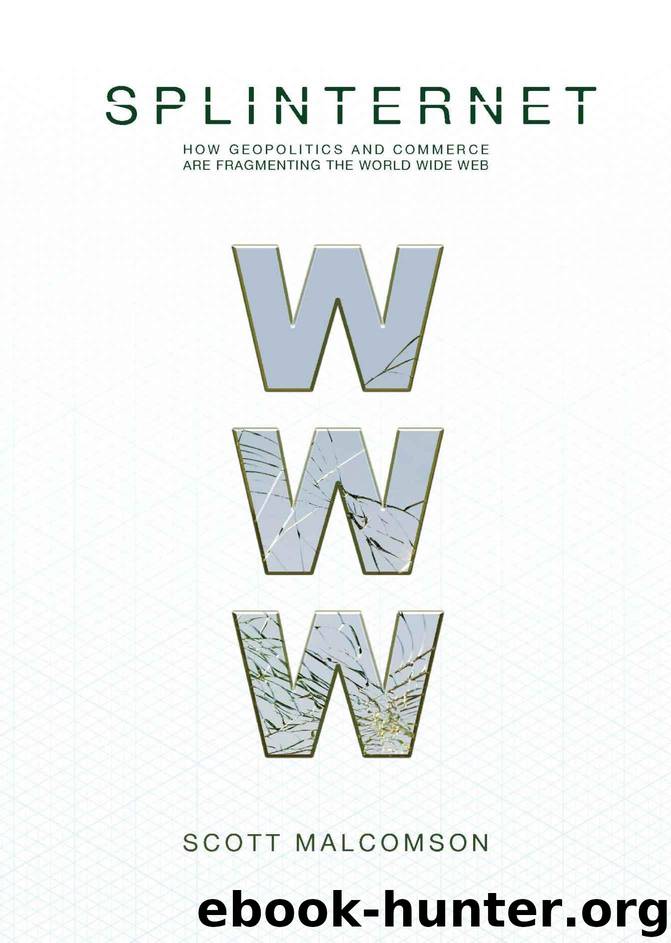Splinternet: How Geopolitics and Commerce are Fragmenting the World Wide Web by Scott Malcomson

Author:Scott Malcomson [Malcomson, Scott]
Language: eng
Format: epub
Tags: Bisac Code 1: COM060000, COM060090
ISBN: 9781682190319
Publisher: OR Books
Published: 2016-01-26T05:00:00+00:00
[T]he Administration will support removal, over time, under appropriate conditions, of judicial and legislative restrictions on all types of telecommunications companies: cable, telephone, utilities, television and satellite . … Our goal is not to design the market of the future. It is to provide the principles that shape that market. And it is to provide the rules governing this difficult transition to an open market for information. We are committed in that transition to protecting the availability, affordability, and diversity of information and information technology, as market forces replace regulations and judicial models that are no longer appropriate . . . . Without provisions for open access, the companies that own the networks could use their control of the networks to ensure that their customers only have access to their programming. We have already seen cases where cable company owners have used their monopoly control of their networks to exclude programming that competes with their own. Our legislation will contain strong safeguards against such behavior.
The National Information Infrastructure Gore was proposing must, he emphasized, be an “open platform.”64
The light-touch, enabling approach of the early Clinton administration was crucial to the growth of the Internet and its relative distancing from a strong national agenda. It was also a recognition of hacker autonomy. Science had been officially de-funded in the 1980s; indeed this was the reason for the NRN report’s hurt and plaintive tone. That left the Internet itself, like the discarded ex-military Tixo that the MIT boys had got from SAGE, as something to be programmed by hackers and obsessives, like Tim Berners-Lee.
When Berners-Lee attended the Hypertext ’91 conference in San Antonio, he and his principal collaborator, Robert Cailliau, were the only ones with a web project. Even then, it was just a demonstration; the paper they submitted had been rejected. The Internet world was still small and that helped it stay open: code, in particular, was meant to be shared, in a continuation of the ethic expressed in the sharing of BASIC at the Homebrew club. (Microsoft was not very interested in the Internet or the web; there was no clear way to monetize an open platform.) As Berners-Lee developed the web, his main institutional anchor was the Internet Engineering Task Force (IETF), a self-governing professional body, founded in 1986, that functioned mainly by email lists. “IETF meetings were characterized by people in T-shirts and jeans, and at times no footwear,” Berners-Lee recalled. “They would meet in different rooms and talk excitedly.” It was a charmingly unhurried world, remote from normal worries.65
These were not really government people. They had their own subculture which was apolitical or maybe antipolitical. It was a subculture that valued discussion and consensus, rather than campaigning and voting, and which valued smart work, specifically the work of writing code to solve real problems. Coding was public performance, in every sense: other engineers could look at your code and see how you solved the problem. But unlike other forms of performance, code was tangible, replicable and, most
Download
This site does not store any files on its server. We only index and link to content provided by other sites. Please contact the content providers to delete copyright contents if any and email us, we'll remove relevant links or contents immediately.
Kotlin in Action by Dmitry Jemerov(18524)
Grails in Action by Glen Smith Peter Ledbrook(16238)
Sass and Compass in Action by Wynn Netherland Nathan Weizenbaum Chris Eppstein Brandon Mathis(13893)
Configuring Windows Server Hybrid Advanced Services Exam Ref AZ-801 by Chris Gill(7510)
Azure Containers Explained by Wesley Haakman & Richard Hooper(7508)
Running Windows Containers on AWS by Marcio Morales(7057)
Microsoft 365 Identity and Services Exam Guide MS-100 by Aaron Guilmette(5444)
Microsoft Cybersecurity Architect Exam Ref SC-100 by Dwayne Natwick(5284)
Combating Crime on the Dark Web by Nearchos Nearchou(5029)
The Ruby Workshop by Akshat Paul Peter Philips Dániel Szabó and Cheyne Wallace(4711)
Management Strategies for the Cloud Revolution: How Cloud Computing Is Transforming Business and Why You Can't Afford to Be Left Behind by Charles Babcock(4558)
Python for Security and Networking - Third Edition by José Manuel Ortega(4284)
The Age of Surveillance Capitalism by Shoshana Zuboff(4264)
Learn Wireshark by Lisa Bock(4183)
Learn Windows PowerShell in a Month of Lunches by Don Jones(4140)
The Ultimate Docker Container Book by Schenker Gabriel N.;(3930)
Ember.js in Action by Joachim Haagen Skeie(3921)
DevSecOps in Practice with VMware Tanzu by Parth Pandit & Robert Hardt(3617)
Windows Ransomware Detection and Protection by Marius Sandbu(3588)
